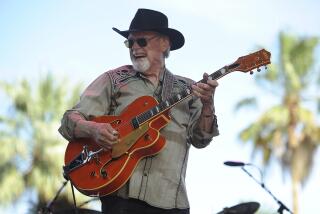Two Retrospectives Salute Original Guitar Heroes
- Share via
Guitarists Duane Eddy and Link Wray earned places in rock history in the late ‘50s with instrumental hits that were as exciting to a generation of rock fans as anything by singers Buddy Holly or Little Richard.
The records--Eddy’s “Rebel Rouser” and Wray’s “Rumble”--helped establish the concept of “guitar hero” in rock and featured sounds that were so seductive they are still used as guitar reference points.
Eddy mixed country and blues strains in a “twangy” sound that was at once mysterious and wondrous. Wray’s music had a darker, more rebellious edge--a sound that matched the teen delinquent connotation of the word rumble .
The styles are saluted in two new Rhino Records retrospectives: “Twang Thang: The Duane Eddy Anthology,” a two-disc package, and “Rumble! The Best of Link Wray,” a single disc album.
Eddy, a Corning, N.Y., native, had far more Top 40 hits than Wray (15 to 2), but Wray, who was born in Dunn, N.C., made records that today sound more captivating. In their respective liner notes for Eddy and Wray, Dan Forte and Cub Koda make strong cases for the artistic contributions of both men.
“Duane Eddy’s . . . ‘Rebel Rouser’ almost single-handedly established the institution of the guitar hero,” Forte declares. “No longer was the guitarist the goofy guy standing behind the sexy-looking singer; suddenly, he was the moody front man with the chiseled cheekbones who (having opened the door to rock ‘n’ roll’s most fertile era of instrumental combos) all but put singers out of work. . . .
“Today the term ‘guitar hero’ usually spells excess, but from the outset Duane was the ultimate minimalist. Here was a guy so cool he didn’t have to play lightning runs--and a guy so shrewd he played things a teen-ager could learn, with a little bit of talent and practice.”
Eddy’s hits--many of them tied to movies or TV shows--included “Forty Miles of Bad Road,” “Because They’re Young” and “The Ballad of Paladin.” The box set contains seven previously unreleased tracks, including a version of the Buck Owens theme song “Buckaroo.”
In writing about Wray, Koda points to “Rumble” as one of the blueprints for heavy metal.
“Though rock historians always like to draw a nice, clean line from the distorted electric guitar work that fuels early blues records to the late-’60s Hendrix-Clapton-Beck-Page-Townshend mob, with no stops in between, any of the records collected here punches holes in that theory.
“If a direct line from a black blues musician crankin’ up his amp and playing with a ton of violence and aggression can be traced to a young white guy doing a mutated form of the same, the line points straight to Link Wray.”
An amusing track on the Wray CD is “Dixie-Doodle,” which finds Wray trying to inject some of the pop elements that are found in many of Eddy’s hits, including the exuberant background shouts.
Mostly, however, Wray sticks to the almost eerie anxiousness that characterizes “Rumble.” Among the classic cuts: Wray’s vocal on a down ‘n’ dirty version of Jimmy Reed’s “Ain’t That Lovin’ You Babe” and his “insane asylum” (as Koda calls it) voice-overs on the showstopper “The Shadow Knows.”
More to Read
The biggest entertainment stories
Get our big stories about Hollywood, film, television, music, arts, culture and more right in your inbox as soon as they publish.
You may occasionally receive promotional content from the Los Angeles Times.









